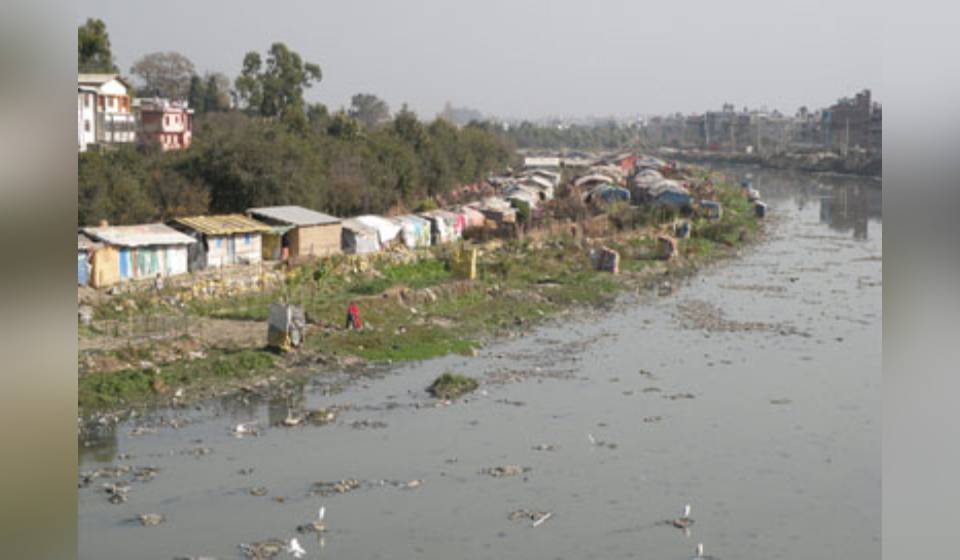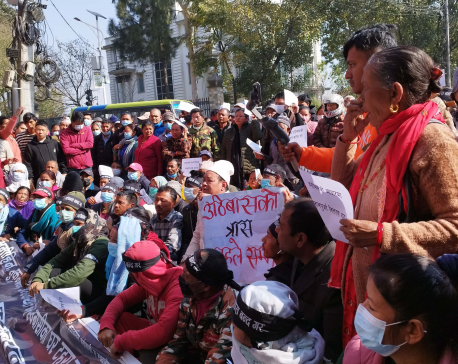
OR
Opinion


Sarans Pandey
The author is an undergraduate student at Macquarie University, Sydneynews@myrepublica.com
It is unfortunate that the needless emotional outbursts, whether it be hatred or sympathy, have overshadowed the structural political lapses perpetuating the problem.
The Sukumbasi (landless squatters) issue in Thapathali has reached the pinnacle in the sphere of public discussion. Much has been said both for and against the measure taken by the Kathmandu Metropolitan City (KMC) and High Powered Committee for Integrated Development of Bagmati Civilization (HPCIDBC) to address the issue. But the majority of the arguments are emotionally fueled and/or legally imperceptive. Instead of focusing on the differences, let us first lay out the ground rules of the discussion that both sides are bound constitutionally to agree to. The constitution guarantees the right to housing to all Nepali citizens. The definition of ‘Sukumbasi’ is clearly defined which eliminates a portion of those who identify themselves as landless squatters. The land the people in Thapathali currently use is only a temporary arrangement and the very constitution that grants all citizens the right to housing also prohibits them from inhabiting riverside spaces. The only area of contention is with regards to the way the KMC proceeded to tackle the issue and it is unfortunate that the needless emotional outbursts, whether it be hatred or sympathy, have overshadowed the structural political lapses perpetuating the problem.
If we look beyond the childish name calling that treats ‘Sukumbasis’ as a ‘vote bank’, media metaphors that use them as ‘views bank’, and transient campaign slogans that see them as ‘morality bank’, the crux of the issue, which is the inability of the commissions meant to tackle the problem, becomes apparent. The problem of the landless squatters is a federal problem unfolding at the local level. With the current constitutional framework, KMC is only supposed to play the role of a cooperator and it is the National Land Commision (NLC) that is supposed to be at the helm. When the KMC tried to take the initiative, it trampled on federal jurisdictions. It was an immature move, but that being said, their haste is understandable when you take into account that there have been 13 other bodies like the NLC over the past three decades trying to solve the issue and none have been able to provide a definitive headway.
Perhaps the aforementioned statistics doesn’t come as a surprise for a nation that boasts of seven constitutions in seventy years but it is nonetheless quite troubling and shows the absence of a well-coordinated long-term strategy to address the problem. Unlike sending and recalling diplomats every time a new government is formed, issues like poverty, landlessness, disaster management cannot be victims to political patronage. They require time, cumulative effort and backing of all political parties or alliances that come to power. But unfortunately, that isn’t the case. The chairman of the National Land Rights Forum, Saraswati Subba has accused the commissions formed over the years of being plagued with political patronage. She argues that instead of experts who know the problem, political cadres are the ones who end up getting appointed to such commissions. After all, how can one with mayoral aspirations in Bharatpur lose and then end up wanting to tackle the problem of landless squatters?
The NLC was formed two years ago. The body before that, known as the Commission on Resolving Land Related Problems, lived for about two years. Even the first land commission formed in 1990 by the KP Bhattarai-led government was replaced by another commission headed by Shailaja Acharya a year later. And that too was subsumed by another commission in 1994. No one knows how long the NLC is going to last. It would have been one thing if every time a new body was commissioned the works of the former were carried forward in some way and efforts were cumulative. But every fresh attempt seems to be greatly isolated from previous efforts. The current state of apartments in Ichangu Narayan constructed during former PM Baburam Bhattarai’s tenure for addressing this very problem serves as evidence of that isolation.
There is a reason why Sustainable Development Goals aiming to tackle poverty are spread over a period like 15 years. There is no magic bullet. The landless problem, which is also part of the poverty problem, requires coordinated plans over longer timeframes. How can institutions that only live a few years have visions to solve a problem which has outlived the lifespans of all those institutions combined? Governments in Nepal are randomly formed and disbanded and these commissions and their policies face a similar fate. A long-term coordinated strategy spread over at least five years to tackle the issue can help provide clarity. For that to happen, the longevity of the commission meant to solve the issue should be guaranteed. The fact that local governments - KMC in this case - have guaranteed five years in leadership should be enough grounds to give them more than a participatory role in solving the problem. After all, it is unfolding in their territory.
For some reason, citizens are under the impression that a mayor is a powerful person in Nepal, and that is true to a certain extent. Even Bhusan Dahal, a prominent journalist, in his interview with Harka Sampang, made a similar comment. But how does one reconcile that power with the fact that much of the good done by Sampang has come through volunteering efforts? If the mayor was indeed powerful, he could have used more formal channels to address the drinking water problem. This becomes more apparent in a metropolitan city where virtually every local issue has a federal dimension. Whether it be the landless squatters problem, drinking water problem, drainage problem, haphazard wire problem or the road problem, in each case a federal body, be it the NEA, NLC or the ministries ensuring their functions, end up playing the main executive role. Hopefully the ongoing discussions also highlight the constraints on a mayor’s powers, mostly those from metropolitan cities, so that the chants of ‘let Balen work’ will be amended to incorporate all mayors in general.
You May Like This

National Land Commission seeks cooperation to solve the issues of landless squatters
KATHMANDU, Jan 5: The Kathmandu District Committee of the National Land Commission has claimed that the issue of landless squatters... Read More...

Resolving the Squatter Problem
No solution to this problem can be found through violence. Winter has already set in and in such a situation,... Read More...

Landless squatters protest outside KMC office
KATHMANDU, Nov 29: The slum-dwellers and landless squatters organized a protest outside Kathmandu Metropolitan City (KMC) office, Sundhara, Kathmandu, on... Read More...








Just In
- NRB to provide collateral-free loans to foreign employment seekers
- NEB to publish Grade 12 results next week
- Body handover begins; Relatives remain dissatisfied with insurance, compensation amount
- NC defers its plan to join Koshi govt
- NRB to review microfinance loan interest rate
- 134 dead in floods and landslides since onset of monsoon this year
- Mahakali Irrigation Project sees only 22 percent physical progress in 18 years
- Singapore now holds world's most powerful passport; Nepal stays at 98th










Leave A Comment